A Grave for Two Read online
Page 7
Selma made up her mind to leave before the press conference was under way. She had no business being here. It had been restlessness that had brought her here, she figured: an intense agitation and a hope that she might learn something more than the policeman had been able to impart last night. Bottolf Odda had moved into sight out there on the podium. He was waiting for something or someone, with his hands folded and his eyes cast down. Pale, and wearing a dark suit and tie, Selma could hardly remember ever seeing him dressed like this.
Two enormous vases of flowers were on display. Something that might be a book of condolence had been set up on a small table at the front corner of the room, with a lit candle beside it. This promised to be more of a memorial service than a press conference.
Selma stood up to leave before it all kicked off.
Indecisive, she sat down again.
It was Saturday, a storm was raging outside, and it wouldn’t be long until Christmas. She still hadn’t bought a single present. It didn’t matter; she didn’t even know where she would be at Christmas. It wouldn’t be on Ormøya, so she had hoped that Vanja and Kristina would invite her now that Vanja had discovered a tiny sliver of Selma’s secret.
That would hardly happen now.
Haakon was dead.
At the age of almost twenty-seven, Vanja and Kristina’s son had somehow inexplicably run off the road. On roller skis, during one training session of an endless number of training sessions. Up by Skar, to all appearances, he had turned and embarked on his return journey down to the city. It was not far. The details surrounding the accident were still extremely unclear, as the policeman had explained last night. Haakon had sustained a head injury and apparently fractured his arm, but neither of these was sufficient to kill anyone. The stream he had been lying in was barely half a metre deep at most, but his body had been found face down. Drowning was the probable cause of death. That was how it looked at present, the inspector had carefully and repeatedly maintained.
We would have to wait and see.
Selma stood up again and tried to make her way out. It was difficult; the surge of journalists and photographers and other people with more or less loose connections to ski sports was never-ending. The ubiquitous Sølve Bang traipsed around at the front, adjusting the bouquets of flowers, and speaking in a quiet, earnest voice to the people seated in the front row.
A caricaturist had once depicted Sølve Bang as Batman’s archfiend the Penguin. The drawing was so like the original and so exquisitely malicious that the artist had been sued for defamation. The conflict had fortunately never reached a courtroom. It didn’t even get to the stage of reconciliation.
It had just evaporated, after Selma had explained as calmly as she could, one or two things about freedom of speech in general and caricatures in particular to her exalted as well as offended client. Sølve Bang had never paid her for that work. But he had at least given up.
Selma was not the only person who had difficulty understanding the man’s influence at the Norwegian Cross-Country Skiing Federation. He had one or two formal duties, such as being on the Selection Committee and the Ethics Board, but none of these corresponded with his true position and power.
The way he looked now, no one would believe he was once one of the world’s greatest cross-country skiing talents.
At the age of sixteen years and nine months, Sølve Bang had won a World Cup race for seniors. Ahead of Koch, Wassberg and Harri Kirvesniemi, the best skiers of the 1982 season. The three veterans had all been slightly miffed that the young lad had even been allowed the chance to have a start number on his chest. He was far too young.
For the rest of that season, Sølve Bang had participated in the age-appropriate classes. And won most of them. His next season was not so glorious, and when he turned eighteen, it looked as if it was all over. He wasn’t injured, and he had trained tenaciously, but it was as if he had shot his bolt. All at once, in an explosion of effort, in the later fabled race in which a rosy-cheeked boy with fuzz on his upper lip had shown the elite of the world how to ski a fifteen-kilometre course.
When he retired at the age of nineteen, the skiing fraternity shrugged their shoulders. History was full of early bloomers, talents that never became any more than that. However, they had not quite managed to forget his name when that same autumn, only a few months after hanging up his skis, he made his debut as a novelist with a book that was sold to thirty-two countries and snatched up most of the existing literary prizes in 1985 and 1986.
Forgotten Tracks was the name of the book, a historical romance about the unknown, extremely young Birkebeiner Sturla Tryggvasson, supporter of Norway’s King Sverre, the true hero of the race to bring the king’s son, Håkon Håkonsson, to Nidaros in 1206. Incredible invention! cheered the reviewer in Dagens Gang when the book was published, while others gave it top marks and splashed it on the front pages.
That mostly took care of things.
So far, so good.
Since then Sølve Bang had produced a book around once a decade, without ever repeating the success of the time when he hadn’t yet turned twenty. All the same he had established a name for himself, or perhaps more accurately retained it, as one of the major figures of Norwegian literature. Selma Falck did not know why, but then she didn’t have much of a clue about books.
About sports, on the other hand, she was fairly expert.
Fortunately Sølve had not caught sight of her, and she tried to duck down in her chair. It was too late to make a serious attempt at escape. The lady with the tight skirt had closed the door and stood sentry there, rigid and serious.
Silence fell.
Bottolf Odda picked up the microphone.
‘Welcome,’ he said in a sombre voice, and cleared his throat. ‘The Cross-Country Skiing Federation has called this brief press conference to mark the tragic accident yesterday evening in which our national team member, Haakon Holm-Vegge, lost his life.’
It grew even quieter in the Dæhlie auditorium, if that were possible.
‘At this time, our thoughts go first and foremost to Haakon’s close family. His partner Elise and their one-year-old son William, of course, and also Haakon’s parents, Vanja Vegge and Kristina Holm. We. Share. Your. Grief.’
He seemed about to break down. The pause was so lengthy that it would have been embarrassing in any other circumstances.
‘As you know,’ he continued at last, ‘Haakon was struggling with a minor shoulder injury that had prevented him from travelling to Davos this weekend. The rest of our women’s and men’s teams are there for the World Cup races today and tomorrow. It is up to each individual whether or not to continue. Those who wish to do so will be permitted to travel home as soon as possible.’
It was no longer just as quiet. The sound of fingers racing over keyboards combined with the rumble of the storm that had eased in the past half-hour.
‘We do not intend to provide any details about what happened in Maridalen. The police will make a more comprehensive statement at the appropriate time. Today I shall simply give a brief explanation of the consequences Haakon’s passing will have for the national team, both in the days that lie ahead and for the remainder of the season. After all, Haakon Holm-Vegge was Norway’s best cross-country skier of the past two years, and we had all been looking forward to seeing him in PyeongChang in February.’
Once again he had to take a moment.
‘But that is not going to happen now,’ he mumbled and cleared his throat.
Someone sniggered. Others shushed.
‘Well.’
The man straightened his back, took a deep breath and prepared to launch into another speech. That lasted for exactly three minutes, but then he was finished. However, he had not been particularly informative. It was unclear both whether and how this would influence the composition of the team that would travel to Toblach the following weekend. No decision had been taken about how the NCCSF would mark the young skier’s far too early death, other than that all sk
iers would wear black armbands this and next weekend. It was still too premature to set a date for the funeral. That the Crown Prince would, however, be present was something that Bottolf Odda, obviously moved, was pleased to announce.
Selma was far from certain that Vanja and Kristina would allow anything of the kind.
Bottolf Odda had finished speaking. He patted his breast pocket, for no apparent reason, and opened the conference to a brief round of questions. Twenty or so hands shot into the air. The questions that followed were uninteresting, and answered in an even more boring fashion. Finally Selma made a serious effort to stand up and move towards the door.
‘Carl Ole Hansgård here, DG Sport!’
The journalist’s voice was lighter, higher and far more insistent than the others had been.
Selma stopped and glanced over her shoulder. The man who had got to his feet was young and fairly short in stature, with red hair, close cropped to a couple of millimetres over his entire head.
‘Will the Federation request a drugs test be carried out on the body of the deceased?’ he asked.
‘What?’
The Cross-Country President stared at him, uncomprehending.
‘We’ve received … we have information that Haakon Holm-Vegge may also have ingested a banned substance, the anabolic steroid Clostebol. The same as Hege Chin Morell, in fact. Will this be checked? And if so, when can we expect a result?’
Bottolf Odda had not had a chance to answer when Sølve Bang leapt up from the first row and seized the microphone.
‘These are malicious rumours none of us have heard until now,’ he said sharply, without a moment’s hesitation. ‘Haakon Holm-Vegge was one of the loudest voices against drug misuse in the whole world of cross-country skiing. Besides, this is neither the time nor the place for this kind of wild speculation. Out of respect for the bereaved, and not least for our recently deceased close friend and colleague, we will now draw this press conference to a close. Thanks for coming.’
A piercing, high-pitched squeal followed – the woman assigned practical details obviously also had problems with the sound system. The red-haired young man was suddenly popular, but clearly had no intentions of speaking to anyone. His fleeting smile should really be triumphant, Selma thought, but most of all it appeared uncertain. She now stood at the exit. As he passed her, he stopped for a second and greeted her by moving his head back in a gesture of recognition.
‘Selma Falck,’ he said, quite unnecessarily.
‘Yes,’ Selma replied, holding out a business card.
To be on the safe side, she had hastily scored out her office number.
‘I’d appreciate it if you’d call me at your earliest convenience. On my mobile.’
‘Yes of course,’ he answered. ‘Maybe.’
Hesitated. Tucked the card into his back pocket and moved on through the crowd.
Selma lingered. Only when the Dæhlie auditorium was almost deserted and the woman in the tulip skirt bloomed with impatience at the door, did she shrug on her coat. She didn’t quite know where to go. Or could go. The apartment in Toftes gate would never become ‘home’, but the cat needed to be fed. Maybe she could go to the cinema; as far as she remembered she had fed the animal before she had gone to Vanja’s the previous evening. One possibility was going to see Vanja and Kristina, but she didn’t feel up to that right now. Tonight, perhaps. Tomorrow. She should actually ring Hege Chin Morell, but since she hadn’t moved forward by as much as a metre since the day before yesterday, there was scarcely any point in that either.
Maybe see to Einar.
Something or other.
She had to think of something. It was no longer possible to lie to herself about why she had made the trip up to Holmenkollen.
She had nothing to do there. The truth was that after her sleepless night with Vanja the urge to log on was worse than it had been at any time since she had given up four weeks ago. It was no longer a matter of the usual restlessness that always came sneaking up on her when she had abstained for some time. Not only the pressure inside her head, the discomfort of being unable to concentrate, the agitation that she could easily shake off because she knew what it took. Now the craving felt physically painful, a tight ache in her diaphragm, soreness in her arms and legs, and she could barely manage to stand still.
She was far too close to giving in and so she headed back to the Tøyen Baths and swam another 2,000 metres.
THE MOBILE PHONE
DG Sport’s short-term temp Carl Ole Hansgård had scarcely left the Cross-Country Skiing Federation’s premises when an older colleague from the same newspaper grabbed him by his jacket shoulder and literally hauled him into his car.
‘Are you a total idiot?’ he snarled. ‘Do you have a brain at all? Is it possible …’
Lars Winther slammed his fist so hard on the steering wheel that he grimaced.
‘… to be so cack-handed? Where did we drag you from? A rubbish dump somewhere, or what?’
‘I … I just meant to …’
‘Shut up. You’re so fucking stupid there should be a bounty on your head. Keep your mouth shut.’
Carl Ole fumbled with his seat belt while his experienced colleague fired up the engine, engaged drive and sped out of the area far faster than the weather and driving conditions merited. He skidded wildly as he pulled out on to the road and was forced to slow down a little. They drove on for a minute or so. The foul weather impaired visibility, and Lars Winther had to crane forward to check his bearings as he approached the first possible parking spot.
‘What the hell were you talking about up there?’ he asked crossly once the car was stationary.
‘I asked if they were going to do a drugs test on the body. If they ran such …’
‘I was there, Carl Ole! I heard what you said. But why on earth did you say that?’
‘Because I was wondering about it, of course! You’d better cut this out!’
The older journalist closed his eyes. Breathing slowly and heavily, he held the wheel with rigid arms.
‘One, two, three.’
Pause. He opened his eyes again.
‘OK. But what was your reason for asking if Haakon Holm-Vegge was going to be tested for drugs post-mortem, then?’
‘I received a tip-off.’
‘A tip-off?’
‘Yes. By text message last night. Before we knew he was dead.’
‘Eh?’
‘At half past eleven. Take a look.’
Quick as a flash, Carl Ole keyed the code into his iPhone and handed it to Lars.
‘Here.’
The message had come from a concealed number, Lars noticed before he read aloud: The skier Haakon Holm-Vegge has died in an accident. If the autopsy is thorough enough, traces of the banned substance Clostebol will be found in his body.
‘Do you see?’ Carl Ole asked eagerly. ‘I had to ask! This is huge, Lars! Why would anyone send me a message like that if …’
‘Idiot. Shut up.’
He handed back the phone and stared out at the rain with unfocused eyes.
‘Messages like that can never be taken at face value just like that, Carl Ole. It’s more likely that someone’s pulling your leg than that Haakon Holm-Vegge has taken drugs.’
‘But …’
‘No, now you have to keep your mouth shut and listen to me. Got it?’
A nod.
‘When did this message arrive? To the minute.’
‘23.32. Just after half eleven.’
‘And the accident took place at some time between eight p.m. and half past, correct? But wasn’t made public until after midnight?’
Yet another submissive nod.
‘When I got to the DG building, there was nothing about the accident anywhere. But before I had a chance to investigate, the news agency issued a press release.’
Lars Winther stretched out his hand to take yet another look at the phone. He forwarded the message to himself, and took a photo of the display with hi
s own phone into the bargain.
‘This instant, you must get hold of one of the IT guys. Let them take a closer look and see if it’s possible to track down the sender. ASAP, right? More to the point, ask Agnes. She’s the best, and I know she’s in town this weekend. Get a new phone from her, and tell her to ring me as soon as she’s got something.’
‘OK. And then what’ll I do?’
Lars started the car, flicked on the indicator and drove slowly out on to the road again.
‘You’ll learn that press conferences are not the place to take up things like that. Write it down on a sheet of paper. Press conferences are not the place to tell our rivals what you know.’
The roar made his colleague shrink into his seat.
‘A thousand times,’ Lars said after a brief pause, braking at the sight of an oncoming lorry that took up almost the entire road. ‘Write it a thousand times on loose sheets of paper. And then write down: When I receive a tip-off that might be a major scoop, I tell an experienced colleague or my line manager. A hundred times should do.’
Carl Ole gave a sheepish grin as he tucked his mobile into his inside pocket.
‘Sure!’
‘Yes, sure. By hand, mind you. Have the bundle on my desk by Monday. And I’ll have that business card.’
He switched the windscreen wipers on to max and held his right hand, palm up, towards his passenger.
‘The business card,’ he repeated. ‘Did she say anything?’
‘Selma Falck?’
‘Yes, who else?’
‘She said nothing. Or … that I should give her a call. Should I do that?’
Lars waved his hand impatiently. Carl Ole raised one buttock and drew the card from his back pocket. Hesitating, he placed it in his colleague’s hand.
‘No,’ Lars said. ‘You won’t do a bloody thing after handing that phone to Agnes. I’ll deal with this.’
‘But …’
‘Listen.’

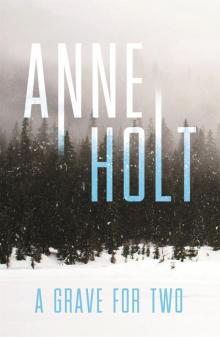 A Grave for Two
A Grave for Two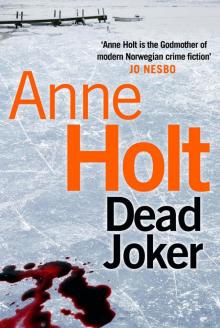 Dead Joker
Dead Joker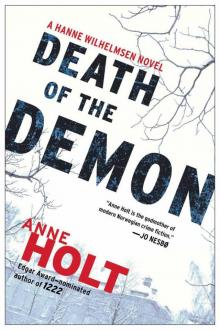 Death of the Demon: A Hanne Wilhelmsen Novel
Death of the Demon: A Hanne Wilhelmsen Novel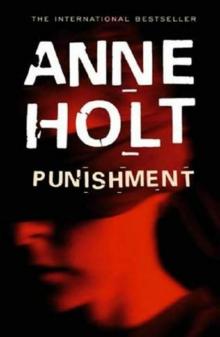 Punishment aka What Is Mine
Punishment aka What Is Mine Beyond the Truth
Beyond the Truth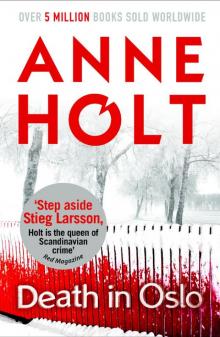 Death in Oslo
Death in Oslo The Blind Goddess
The Blind Goddess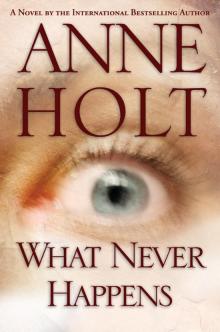 What Never Happens
What Never Happens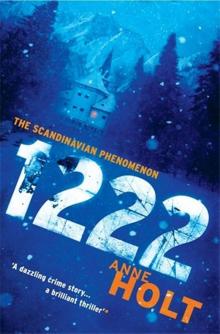 1222
1222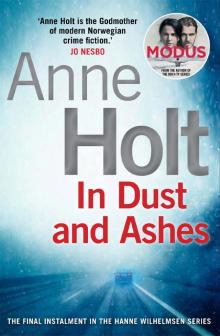 In Dust and Ashes
In Dust and Ashes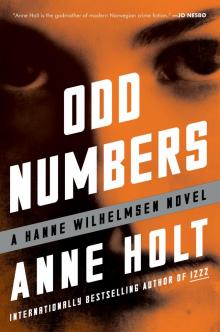 Odd Numbers
Odd Numbers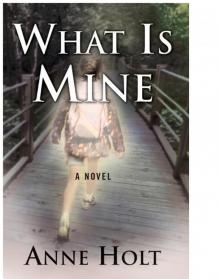 What is Mine
What is Mine What Dark Clouds Hide
What Dark Clouds Hide Blessed Are Those Who Thirst
Blessed Are Those Who Thirst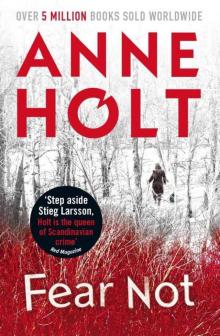 Fear Not
Fear Not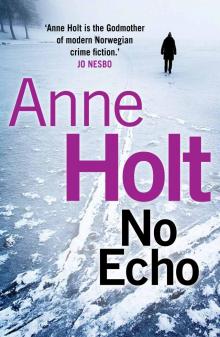 No Echo
No Echo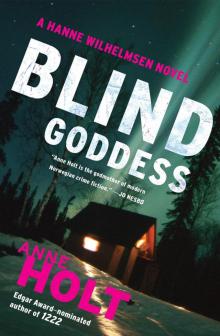 Hanne Wilhelmsen - 01 - The Blind Goddess
Hanne Wilhelmsen - 01 - The Blind Goddess